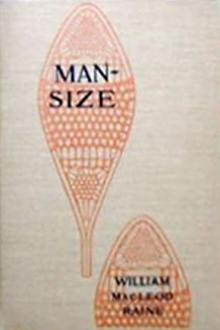Laughing Bill Hyde and Other Stories by Rex Beach (ebook smartphone .TXT) 📗

- Author: Rex Beach
Book online «Laughing Bill Hyde and Other Stories by Rex Beach (ebook smartphone .TXT) 📗». Author Rex Beach
However, to find employment in a community where there were two men to one job was not easy, but happily—or unhappily—Bill had a smattering of many trades, and eventually there came an opening as handy-man at a mine. It was a lowly position, and Bill had little pride in it, for he was put to helping the cook, waiting on table, washing dishes, sweeping cabins, making beds, and the like. He had been assured that the work was light, and so it was, but it was also continuous. He could summon not the slightest interest in it until he discovered that this was the very claim which rightfully belonged to Ponatah. Then, indeed, he pricked up his ears.
The Aurora Borealis, as the mine was now called, had been working all winter, and gigantic dumps of red pay-dirt stood as monuments to the industry of its workmen. Rumor had it that the "streak" was rich, and that Doctor Slayforth, the owner, would be in on the first boat to personally oversee the clean-ups. The ex-missionary, Bill discovered, had the reputation of being a tight man, and meanly suspicious in money matters. He reposed no confidence in his superintendent, a surly, saturnine fellow known as Black Jack Berg, nor in Denny Slevin, his foreman. So much Laughing Bill gathered from camp gossip.
It soon became evident that Black Jack was a hard driver, for sluicing began with the first trickle of snow water—even while the ditches were still ice-bound—and it continued with double shifts thereafter. A representative of Doctor Slayforth came out from Nome to watch the first clean-up, and Bill, in his capacity as chambermaid, set up a cot for him in the cabin shared by Black Jack and Denny. While so engaged the latter discovered him, and gruffly ordered him to remove the cot to the bunk-house.
"Put him in with the men," growled Slevin. "Serves the dam' spy right."
"Spy? Is he a gum-shoe?" Mr. Hyde paused, a pillow slip between his teeth.
"That's what! Me and Jack was honest enough to run things all winter, but we ain't honest enough to clean up. That's like old Slayforth—always lookin' to get the worst of it. I'm square, and so's Jack. Makes me sick, this spyin' on honest folks. Everybody knows we wouldn't turn a trick."
Now it was Laughing Bill's experience that honesty needs no boosting, and that he who most loudly vaunts his rectitude is he who is least certain of it.
"The boss must be a good man, him being a sort of psalm-singer," Bill ventured, guilelessly.
Denny snorted: "Oh, sure! He's good, all right. He's 'most too good—to be true. Billy, my boy, when you've seen as many crooks as I have you'll know 'em, no matter how they come dressed."
As he folded the cot Mr. Hyde opined that worldly experience must indeed be a fine thing to possess.
"You go gamble on it!" Slevin agreed. "Now then, just tell that Hawkshaw we don't want no dam' spies in our house. We're square guys, and we can't stomach 'em."
That evening Black Jack called upon the handy-man to help with the clean-up, and put him to tend the water while he and Denny, under the watchful eye of the owner's representative, lifted the riffles, worked down the concentrates, and removed them from the boxes.
Bill was an experienced placer miner, so it was not many days before he was asked to help in the actual cleaning of the sluices. He was glad of the promotion, for, as he told himself, no man can squeeze a lemon without getting juice on his fingers. It will be seen, alas! that Mr. Hyde's moral sense remained blunted in spite of the refining influence of his association with Doctor Thomas. But Aurora dust was fine, and the handy-man's profits were scarcely worth the risks involved in taking them.
One morning while Bill was cleaning up the superintendent's cabin he noticed a tiny yellow flake of gold upon the floor in front of Slevin's bed. Careful examination showed him several "colors" of the same sort, so he swept the boards carefully and took up the dust in a "blower." He breathed upon the pile, blowing the lighter particles away. A considerable residue of heavy yellow grains remained. With a grin Bill folded them in a cigarette paper and placed them in his pocket. But it puzzled him to explain how there came to be gold on the cabin floor. His surprise deepened when, a few days later, he found another "prospect" in the same place. His two sweepings had yielded perhaps a pennyweight of the precious metal—enough to set him to thinking. It seemed queer that in the neighborhood of Black Jack's bunk he could find no pay whatever.
Slevin had left his hip boots in the cabin, and as Laughing Bill turned down their tops and set them out in the wind to dry his sharp eye detected several yellow pin-points of color which proved, upon closer investigation, to be specks of gold clinging to the wet lining.
"Well, I be danged!" said Mr. Hyde. Carefully, thoughtfully, he replaced the boots where he had found them. The knowledge that he was on a hot trail electrified him.
At the next clean-up Laughing Bill took less interest in his part of the work and more in Denny Slevin's. When the riffles were washed, and the loose gravel had been worked down into yellow piles of rich concentrates, Slevin, armed with whisk broom, paddle, and scoop, climbed into the sluices. Bill watched him out of a corner of his eye, and it was not long before his vigilance was rewarded. The hold-up man turned away with a feeling of genuine admiration, for he had seen Slevin, under the very nose of the lookout, "go south" with a substantial amount of gold.
The foreman's daring and dexterity amazed Bill and deepened his respect. Slevin's work was cunning, and yet so simple as to be almost laughable. With his hip boots pulled high he had knelt upon one knee in the sluice scooping up the wet piles of gold and black iron sand, while Berg held a gold pan to receive it. During the process Black Jack had turned to address the vigilant owner's representative, and, profiting by the brief diversion, Bill had seen Denny dump a heaping scoop-load of "pay" into the gaping pocket-like top of his capacious rubber boot.
"The sons-of-a-gun!" breathed Laughing Bill. "The double-crossing sons-of-a-gun! Why, it begins to look like a big summer for me."
Bill slept well that night, for now that he knew the game which was going on he felt sure that sooner or later he would take a hand in it. Just how or when the hand would fall he could not tell, but that did not worry him in the least, inasmuch as he already held the trumps. It seemed that a kindly fortune had guided him to the Aurora; that fate had decreed he should avenge the wrongs of Ponatah. The handy-man fell asleep with a smile upon his lips.
The first ship arrived that very evening, and the next day Doctor Slayforth in person appeared at the Aurora. He was a thin, restless man with weak and shifting eyes; he said grace at dinner, giving thanks for the scanty rations of hash and brown beans over which his hungry workmen were poised like cormorants. The Aurora had won the name of a bad feeder, but its owner seemed satisfied with his meal. Later Bill overheard him talking with his superintendent.
"I'm disappointed with the clean-ups," Slayforth confessed. "The pay appears to be pinching out."
"She don't wash like she sampled, that's a fact," said Black Jack.
"I'm afraid we shall have to practise economies—"
"Look here! If you aim to cut down the grub, don't try it," counseled
Berg. "It's rotten now."
"Indeed? There appeared to be plenty, and the quality was excellent. I fear you encourage gluttony, and nothing so interferes with work. We must effect a saving somehow; there is too great a variation between theoretical and actual values."
"Huh! You better try feeding hay for a while," sourly grumbled the superintendent. "If you ain't getting what you aimed to get it's because it ain't in the cards."
This conversation interested Bill, for it proved that the robbers had helped themselves with a liberal hand, but how they had managed to appropriate enough gold to noticeably affect the showing of the winter's work intensely mystified him; it led him to believe that Black Jack and Denny were out for a homestake.
That such was indeed the case and that Slevin was not the only thief Bill soon discovered, for after the next clean-up he slipped away through the twilight and took stand among the alders outside the rear window of the shack on the hill. From his point of concealment he could observe all that went on inside.
It was a familiar scene. By the light of an oil lamp Black Jack was putting the final touches to the clean-up. Two gold pans, heaped high with the mingled black sand and gold dust, as it came out of the sluices, were drying on the Yukon stove, and the superintendent was engaged in separating the precious yellow particles from the worthless material which gravity had deposited with it. This refining process was slow, painstaking work, and was effected with the help of a flat brass scoop—a "blower." By shaking this blower and breathing upon its contents the lighter grains of iron sand were propelled to the edge, as chaff is separated from wheat, and fell into a box held between the superintendent's knees. The residue, left in the heel of the blower after each blowing process, was commercial "dust," ready for the bank or the assay office. Doctor Slayforth, with his glasses on the end of his nose, presided at the gold scales, while Denny Slevin looked on. As the dust was weighed, a few ounces at a time, it was dumped into a moose-skin sack and entered upon the books.
Black Jack had the light at his back, he was facing the window, therefore Laughing Bill commanded an unobstructed view of his adept manipulations. It was not long before the latter saw him surreptitiously drop a considerable quantity of gold out of the scoop and into the box between his knees, then cover it up with the black sand. This sleight-of-hand was repeated several times, and when the last heap of gold had been weighed Bill estimated that Doctor Slayforth was poorer by at least a hundred ounces—sixteen hundred dollars. There was no question about it now; these were not common thieves; this was becoming a regular man's game, and the stakes were assuming a size to give Laughing Bill a tingling sensation along his spine. Having discovered the modus operandi of the pair, and having read their cards, so to speak, he next set himself to discover where they banked their swag. But this was by no means easy. His utmost vigilance went unrewarded by so much as a single clue.
Berg and Slevin had a habit of riding into town on Saturday nights, and the next time they left the claim Bill pleaded a jumping toothache and set out afoot for medical attention.
It was late when he arrived at Nome, nevertheless a diligent search of the Front Street saloons failed to locate either man. He was still looking for them when they came riding in.
With their delayed arrival Bill's apprehensions vanished, as likewise did his imaginary toothache. He had feared that they were in the habit of bringing the gold to Nome, there perhaps to bank it with some friend; but now he knew that they were too cautious for that, and preferred instead to cache it somewhere in the hills. This simplified matters immensely, so Bill looked up his little doctor for a sociable visit.
Thomas was in his office; he greeted Bill warmly.
"Say! Pill-rolling must be brisk to keep you on the job till midnight," the latter began.
"Business is rotten!" exclaimed the physician. "And it's a rotten business."
"Nobody sick? That's tough. Open a can of typhoid germs, and I'll put 'em in the well. Anything to stir up a little trade."
"I've just balanced my books and—I've just heard from Alice."
"Do the books balance?"
"Oh, perfectly—nothing equals nothing—it's a perfect equilibrium. Alice wants me





Comments (0)